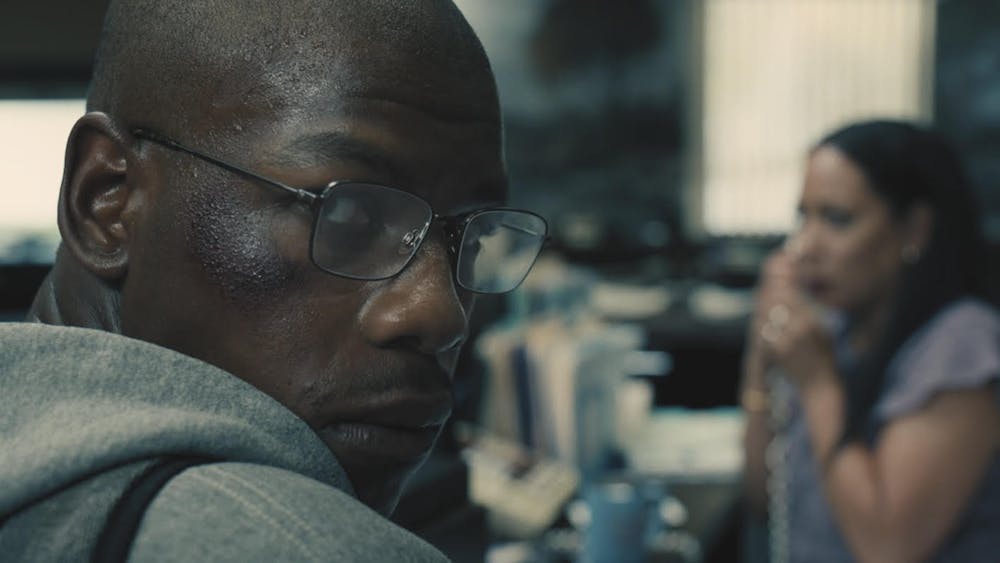In July 2017, former Lance Corporal Brian Brown-Easley entered a Wells Fargo bank in an Atlanta suburb and informed employees he had a bomb in his backpack that he would detonate if the Department of Veterans Affairs office did not provide him with his monthly disability payment. “Breaking,” released wide in the U.S. on Aug. 26, depicts that fateful day with a sympathetic eye, providing audiences with a taut and hard to watch thriller.
The film, which marks the feature-length debut of director-screenwriter Abi Damaris Corbin, documents the unfolding of the robbery, only occasionally breaking off into flashbacks to establish Brown-Easley’s family life, military service and the events leading up to present day.
The film hinges almost entirely on John Boyega’s portrayal of Brown-Easley. The criminally underutilized “Star Wars” actor strongly demonstrates his previously untapped potential that’s been visible for years to those who have watched his career closely. Boyega keeps you consistently engaged and enthralled, never wasting a moment to demonstrate the desperate highs and devastating lows of a very complex subject.
While Boyega certainly does a majority of the heavy lifting, he has a few helping hands on either side of him to help carry some of the weight. Nicole Beharie as Estel Valerie and the late Michael K. Williams as Eli Bernard are both particular standouts in their own way; Beharie perfectly captures bank manager Valerie’s outward confidence and inward fear, with Williams providing his typically magnetic understatedness to cop Bernard, grappling with his own allegiances to the predominantly white police force.
All the characters present in the film help Damaris Corbin delicately tackle a slew of complex societal issues with subtlety and precision. Valerie, who volunteers at homeless shelters, has seen and heard countless stories like Brown-Easley’s and shares in his frustration. Bernard shows up late to the scene and becomes frustrated with how the situation has been handled so far, opting at many points to take matters into his own hands.
It’s really the conversations between Boyega’s Brown-Easley and Williams’ Bernard that lie at the heart of what the film is trying to say. Bernard also served in the Marine Corps and had numerous issues with the VA himself. Both men take solace in knowing that they are not alone and they each share in these frustrations that society has created for them, frustrations that tragically led to Brown-Easley carrying out his actions.
It’s easy to see what criticisms may be reserved for the film: the plot is unfortunately predictable and Damaris Corbin doesn’t do an excellent job at keeping the film entirely engaging, as is the problem with many films taking place almost entirely in one location.
For me, while I did certainly share in these issues while watching the film, they’re not entirely detrimental. In most cases, a predictable film can make for a less-than-stellar viewing experience, but with “Breaking,” it allows you to take your attention away from the strict goings-on of the film and focus on the immaculate performances and nuanced discussions of race, class, homelessness and the treatment of veterans in the U.S. Boyega’s work in the lead role also helps to maintain engagement, albeit not entirely.
These are rather minor issues with a film that is well-crafted. Along with the outstanding performances, the directing and cinematography also help to elevate this film. It was quite exciting to watch cinematographer Doug Emmett continually come up with new and engaging compositions throughout the film, even when restricted to one location.
“Breaking” ultimately finds the most success in how it handles its difficult subject matter. It would have been easy for the film to dip into typical biopic-style melodrama, but the cast and crew behind this film all seem to have a deep understanding and sympathy for Brown-Easley’s story. The ultimate irony becomes distributor Bleecker Street’s poor marketing and roll out of the film; for a movie centered around a man desperate for those to hear his story, the people in charge seem to still not care enough about making sure he’s heard.
John Scott is the editor-in-chief at the Daily Lobo. He can be contacted at editorinchief@dailylobo.com or on Twitter @JScott050901
Get content from The Daily Lobo delivered to your inbox






